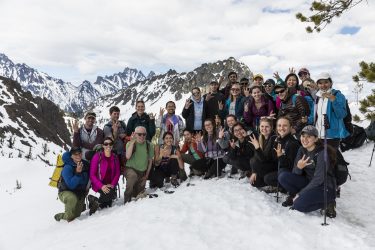
Professor Hinckley’s lifetime of learning
After leading countless field trips, School of Environmental and Forest Sciences Professor Emeritus Tom Hinckley still learns something new every time he enters the forest.
“When you learn to see all the parts of an ecosystem, you become more comfortable walking into a forest. You know the context, the history, the stories. It’s similar to visiting a museum after taking an art history course. Suddenly you have a broader understanding of the paintings because you know something about the context of their creation.”
From its earliest offerings, Tom’s signature immersive learning course, Spring in the Cascades, recruited students from a broad range of disciplines who brought different insight and experiences to the landscape. Over time, they opened Tom’s eyes to the connections between outdoor access, equity and justice.
“The journey I’ve taken grew out of recognizing my own weaknesses,” he says. “As a graduate student, I had a very specific understanding of what it meant to be outdoors: why it mattered, what you could gain from it, what places deserved our protection. Exploring our region with students from different cultures introduced me to people with diverse, historically longer connections to these landscapes. It woke me up.”
Breaking down barriers to field courses
“Financial barriers shouldn’t prevent students from learning.”
One particular experience caused Tom to create the Thomas Hinckley Student Support Fund in Environmental and Forest Sciences.
“Years after going on field trips with me, a former student shared that he remembered how much he enjoyed learning in the forest, but that he had to skip lunch and dinner to afford going. How had I missed that students were showing up hungry?
“I started to see the hard tradeoffs that many students make in order to participate in class. Financial barriers shouldn’t prevent students from learning.”
Through scholarships that cover course fees, the Student Support Fund makes immersive learning more accessible to low-income students. Tom also began bringing food and water on trips so anyone needing a snack could get something to eat.
“It’s a privilege to hit the trails without thinking twice about how you’ll get there or what you’ll have to trade-off to afford the trip,” Tom says. “If we don’t recognize and remove those barriers, students lose opportunities to engage in valuable field experiences—and we all suffer because we’ll never learn what insight they could teach us.”
What you care about can change the world
The generous support of donors like Tom Hinckley makes immersive learning in the field accessible for more UW undergraduates. You can help break down financial barriers to outdoor classes and provide students with skills and experiences that will serve them beyond graduation.

